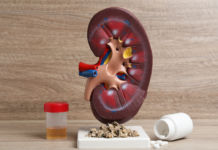Sponsored by: Renadyl™
If you have or are at risks for heart or kidney disease, it’s important for you to understand the connection between the heart and the kidney. Many people do not realize the importance of this connection. Let’s take a look at how the kidneys and heart work together.
How do the kidneys and heart work together?
The heart pumps blood filled with oxygen through the whole body, including the kidneys. The kidneys clean the blood, removing waste products and extra water. Without the kidneys, your blood would have too much waste and water. Without the heart, your kidneys would not have the oxygen-filled blood needed to do their many functions. Without the help of your kidneys, the heart would be working too hard or would not function at all. A healthy functioning cardiovascular system is important for your kidneys to do their job. Heart disease is commonly seen in dialysis patients. Studies have shown that cardiovascular disease (heart and blood vessel disease) is ten to twenty, maybe even thirty times more common in dialysis patients than in the general population. What exactly is the link between kidney failure and heart disease? Let’s look at two possible connections below:
- Hypertension (high blood pressure):
As fluid volume increases between dialysis treatments, blood pressure increases. This rise in pressure places a strain on both the muscle of the heart and the blood vessels. Over time, the heart’s left ventricle becomes enlarged, and heart failure may follow. High blood pressure also leads to plaque formation within the blood vessels. The plaque decreases the inside diameter of the blood vessel, restricting the flow of blood. Angina (chest pain) and myocardial infarction (heart attack) may then occur.
- An elevated phosphorus and calcium:
As the kidneys fail, blood levels of phosphorus and calcium increase. This can lead to calcification inside the wall of the blood vessels. If the vessels that supply the heart muscle becomes calcified, angina and myocardial infarctions can occur. This entail leads to heart disease.
There is good news: heart disease can be minimized. To help prevent the problems listed above, the following information is recommended:
- Keeping your pre-dialysis blood pressure below 140/90, by (a) staying close to your target weight, (b) restricting fluid and salt intake, and (c) taking blood medications as prescribed.
- Keeping (a) your blood calcium level at or below 9.5 mg/dl, and (b) your phosphorus level at or below 5.5 mg/dl.
- Avoiding high phosphorus food and taking phosphorus binders.
Also, persons with kidney failure should avoid smoking, keep cholesterol or lipid levels at a normal level, treat inflammations, be physically active, and treat elevated PTH levels. These too will help decrease the risk of heart disease. If you have any questions about the heart-kidney connection talk with your doctor.
Learn more about our sponsor Renadyl here https://bit.ly/3sZDWbb
About the author
Steven Belcher, RN, MSN, MS, is a dedicated kidney advocate who began his journey 20 years ago as a dialysis nurse. This job inspired him to help as many people with kidney disease as he could. Not only did he spend two decades caring for a patient’s physical and emotional needs in a clinical setting, but he also educated the public on the risk factors of kidney disease. Some of his many philanthropic successes include being a keynote speaker at the National Association of Nephrology Technicians/ Technologists (NANT), presenting at community spaces, and launching radio shows.
He now focuses his time entirely on his organization Urban Kidney Alliance, which educates the public about kidney disease. His goal? To lower rates of Chronic Kidney Disease in urban communities in Baltimore, Maryland, across the country, and globally through education and collaboration.
Steve has also written the book “HOW TO SURVIVE OUTPATIENT HEMODIALYSIS: A GUIDE FOR PATIENTS WITH KIDNEY FAILURE.” You can read the book review here.
*These statements have not been evaluated by the US Food and Drug Administration. This information is not intended to diagnose, treat, cure, or prevent any disease. Always consult with a qualified healthcare professional prior to beginning any diet or exercise program or taking any dietary supplement. The content on our website is for informational and educational purposes only.




